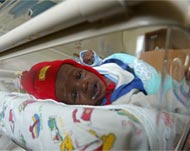UN sets goal to fight AIDS
With 8000 Aids victims dying every day, the UN has unveiled plans to rush life saving anti-retroviral drugs to three million of the world’s poorest sufferers.

The plans made public on Monday are part of a $5.5 billion emergency strategy to fight a disease that has claimed 28 million lives.
World Health Organisation (WHO) Director-General Lee Jong-wook stressed the importance of the initiative in a statement to mark World Aids Day.
“The lives of millions of people are at stake. This strategy demands massive and unconventional efforts to make sure they stay alive.
“Preventing and treating AIDS may be the toughest health assignment the world has faced, but it is also the most urgent.”
ARV treatment
The world body announced last week that 40 million people around the world are infected with HIV, and that the global AIDS epidemic shows no signs of abating.
The UN’s WHO estimates that six million people in poor countries are in immediate need of the anti-retroviral (ARV) treatment that many rich world sufferers now take for granted, but less than 300,000 actually receive it.
 |
|
A four-month-old boy in Nairobi |
The strategy requires getting ARV treatment to half of the six million by the end of 2005.
The WHO is expected to provide details of how to widen access to combination therapy at the global launch of the strategy in Kenya.
The aim is to ensure that all people living with AIDS, even in the poorest settings, have access to treatment through a simplified approach.
Combination therapy
Experts said a pillar of the plan will be a vast increase in the manufacture and distribution of combination therapy ARVs under which sufferers need only take two pills a day.
It is a simpler treatment regime than standard rich world programmes which require eight or more pills a day, and means compliance by patients in poor countries should be good.
The distribution of combination therapy has implications for the pharmaceutical business: multinational firms have often been prevented by patent restrictions from producing combination pills, a worry not shared by generic drugs manufacturers.
The WHO is also calling for money from donor governments and funding agencies.
“We know what to do but what we urgently need now are the resources to do it,” said Lee. “We must waste no time.”